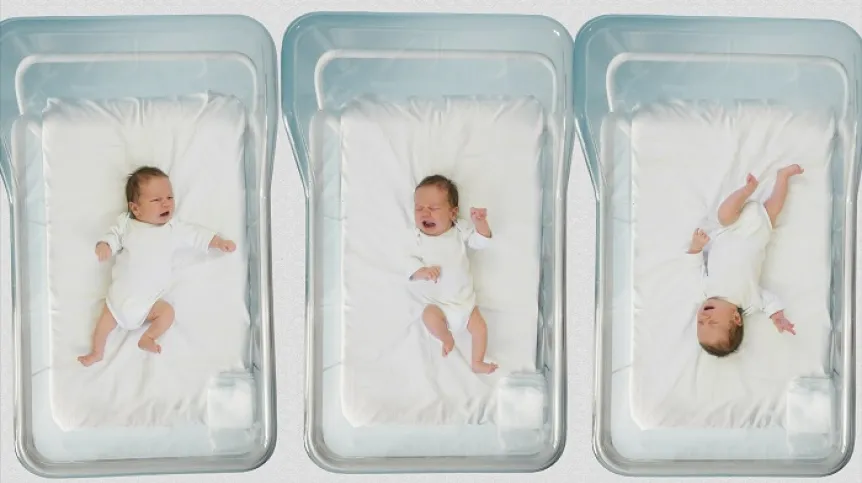
Social crises have a negative impact on reproductive decisions, says a demographer from the University of Łódź.
According to Professor Piotr Szukalski, the phenomena can be seen in the lower number of births in Poland during the pandemic, and the war in Ukraine could have a similar impact.
He said: “In the situation of social crises, people tend to either avoid making long-term commitments, such as getting married or having children, or they delay these decisions. Due to COVID restrictions, the number of newly formed marriages suddenly dramatically decreased, so we expected that a year or two after the restrictions were lifted, we would see a higher number of marriages.
“Meanwhile, looking at monthly data from last year, the numbers are close to those from 2019, but there are no signs of recovering the losses related to the pandemic.”
The demographer analysed how the COVID-19 pandemic impacted reproductive decisions of Polish women and men. He mainly focused on the significant decrease in birth numbers and the fertility rate. The number of live births decreased from 375,000 in 2019 to 355,300 in the following year and 331,500 in 2021. Even an increase in births given in Poland by mothers with non-Polish citizenship did not improve the situation.
Szukalski said: “The number of Ukrainian women giving birth in Poland has been increasing for several years. In 2021, almost 3 percent of children born in Poland had mothers with non-Polish citizenship, while in 2014 it was only 0.5 percent.
“I would like to point out, however, that although many pregnant refugees arrived this year and many children were born, they will not be included in our statistics that only cover permanent residents. In the case of foreign citizens, this means people with permanent residency rights.”
The fertility rate - referring to the average number of children that a woman would give birth to if fertility were to remain at the level observed in a given year - decreased from 1.419 in 2019 to 1.320 in 2021 (1.378 in 2020).
Szukalski said: “We really don't know yet how the war in Ukraine has affected the birth rate in Poland, because due to the 9-month pregnancy period we only started to observe its effects in the last few weeks. We still do not have complete data for December 2022, and only with these data we will be able to preliminarily say whether there was a sudden change in procreative decisions.”
During the communist period in Poland, only 4-6 percent children were born in extramarital relationships, and since the end of the 1980s there has been a steady increase.
It also slightly increased during the COVID-19 pandemic despite the fact that mainly young women decided against motherhood, and they are most often the ones who decide to have children without previously marrying the father. The rate of extramarital births in the years 2019-2021 was, respectively: 25.4 percent, 26.4percent, and 26.7 percent.
Szukalski said that due to lower professional activity of women living in the countryside and the greater sense of security provided by life outside of large centres during the pandemic, it would seem that the demographic crisis would affect such environments to a lesser extent. However, the opposite effect was recorded: in the case of the decisive majority of one-year age groups, the women in the countryside have a larger decrease in fertility rate than their urban peers, which is also visible when comparing changes in the fertility rate. In 2019 it was 1.407 in cities and 1.427 in the countryside, and in 2021 it was respectively 1.331 and 1.301.
As expected, the comparison of fertility in individual counties shows that the smallest decreases were recorded during the pandemic in large cities, and the largest in rural areas of Eastern Poland. The data show that residents of large areas in the Podlaskie, Świętokrzyskie, and Podkarpackie regions have a very low readiness to have children.
Independent of the crisis situations, the average Polish woman gives birth to her first child quite late, around the age of 29, and reaches the highest fertility around thirty. Professor Piotr Szukalski believes that this trend will not change.
He said: “Remember that compared to the generation of mothers of today's young women, a huge change has happened: the average time of education has increased by three years. Not everyone goes to college, so I'm not talking about five years. This means a later entry into the job market, in which the first years are often associated with uncertainty and employment changes. Reaching the point when a young woman considers herself to be sufficiently independent is delayed by several years.”
According to the researcher, we should not expect to be able to stop the process of postponing procreation decisions by Polish women, considering that in many western and northern European countries, the average age of first pregnancy is still two years higher than in Poland.
PAP - Science in Poland, Agnieszka Grzelak-Michałowska
agm/ joz/ kap/
tr. RL













